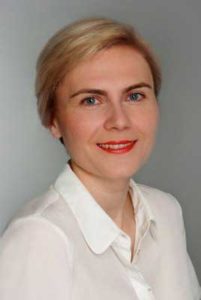The Discovery of the You – From Love to Wisdom to the Wisdom of Love
Author: Dr. Silvia Richter
The author takes us on a short journey through modern Jewish philosophy, where we meet important thinkers of this tradition like Hannah Arendt, Martin Buber and Emmanuel Levinas. Love is our compass for this journey. They all describe different facets of love, and at the same time they all culminate in the other. In the You. Between the You and the I, the space emerges in which love happens.
Truth exists only in two.
The Jewish philosopher Hannah Arendt once wrote to her second husband Heinrich Blücher, thus highlighting a perspective of thought that is particularly rooted in the Jewish tradition. The opposite has always played a central role in Jewish thought. From the Song of Songs in the Bible to the Talmudic discourses in antiquity to the philosophy of dialogue in the 20th century. The focus was and is less on the possession of truth. More on the process of finding the truth. Not who is right wins, but the common search for truth fulfills the dialogue partners.
Therefore it is not surprising that love was also never excluded in Jewish philosophy. Quite the contrary! The concept of “love of wisdom”, as the Greeks literally expressed it in the word philosophia, was further developed in Jewish thought into a “wisdom of love”. In his book of the same name, the French philosopher Alain Finkielkraut outlines a state of mind in which my counterpart – the other and stranger – forces me into my existence and calls me to responsibility. In this fundamental responsibility, all knowledge is in itself relational and grows out of relationship. wWhether we like it or not.
Therefore, real knowledge is always also a wisdom of love
– And a gratitude for the experience of this love.
THE WORK OF PHILOSOPHER HANNAH ARENDT
Almost a hundred years later, another Jewish thinker took Rahel’s life as a source of inspiration. She was the starting point for her postdoctoral thesis: The young Hannah Arendt, who had already devoted her doctoral dissertation to the subject of love, also processed her own philosophical and personal problems to some extent in her biography of Rahel Varnhagen. She begun writing in 1929 and completed in 1938 in exile in Paris – at least so Arendt’s biographer Young-Bruehl claims:
Just as Rahel was a woman often abandoned by her lovers, Hannah Arendt’s failed affair with Martin Heidegger had caused her to lose her love. However, this by no means caused Arendt to sink into melancholy. On the contrary, she productively incorporated this experience into her work. She repeatedly grappled with the phenomenon of love. This can be seen above all in a look at her thought diary. In this, a large number of passages with reference to love can be found. I can present only a small selection in the following.

Hannah Arendt – Jewish philosopher
Love makes us see.
First of all, the freshness and impartiality with which Arendt, in her own way, simply gets rid of traditional sayings about love, such as the statement that love makes you blind, are surprising. Quite the opposite is the case! Love makes us see. But for what?
For “the darkness of the heart,” Arendt says, and elaborates, “The lighting up of the darkness of the heart is the ‘coup de foudre.’ Wherever such lighting up takes place, that is, wherever the heart opens up in the truest sense of the word, there is love.” Something inexplicable, something dark remains in the taste of love. Something that can never really be dissolved and therefore always drives us to see another flashing of it. To illuminate the dark landscape of our heart.
The Other calls me into my being, he calls me to a radical responsibility that goes beyond my being. This relationship with the Other transcends the level of being (ontology). As Levinas states: “The relation with the Other, then, is not ontology. This bond with the Other (…) we call religion. The essence of speech is prayer.”
 The discovery of the Thou – From love to wisdom to the wisdom of love.
The discovery of the Thou – From love to wisdom to the wisdom of love.
Where does love find its place here? It comes into play in Levinas precisely where one would least expect it. Namely, in Levinas’ late philosophy, in which he characterizes the relationship to the Other as one of being hostage to the Other. This seems like a very radical step. Why am I hostage to the Other? What is the relationship here? Levinas explained it this way in an interview with Bernhard Casper: “(…) being a hostage is perhaps just a hard name for love.”
Each and every one of us who has ever been truly in love knows about the vulnerability inherent in this state. One is at the mercy of the other in a radical way. Levinas was also aware of this. And he is one of the few philosophers who did not simply exclude this important existential state – as something “humanly all-too-human,” if not downright unserious, which does not belong in the high realm of philosophy. On the contrary, he productively included it in his thinking. For where our greatest weakness lies, there is also the germ of our strength. Thus vulnerability (vulnerabilité), obsession (obsession), and closeness (proximité) become core concepts of Levinas’s late philosophy. At the same time they illuminate what he means when he speaks of being hostage to the other. “Perhaps only a hard name for love.”
To conclude with a brief résumé: Now, what is the common ground – if there may be one – between all these different positions presented? Is there something like a “red thread” with regard to the topic of love in Jewish philosophy?
 About the author
About the author
Dr. Silvia Richter studied history, philosophy, and Jewish studies in Heidelberg; in 2011, she received her doctorate from the Heidelberg University of Jewish Studies. In 2012, she worked in Paris at the Mémorial de la Shoah. Since 2013, she has been a research associate at the Guardini Professorship at Humboldt University in Berlin.
This article appeared originally on the German Homepage Tattva Viveka: Liebe in der jüdischen Philosophie




